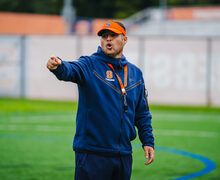Berman : For college athletes, media criticism comes with territory
Oklahoma State football coach Mike Gundy arrived at his day-after press conference following a win over Texas Tech three weeks ago and became a YouTube sensation.
You’ve probably seen the Gundy footage by now. He was admonishing a column in The Oklahoman that questioned quarterback-turned-receiver Bobby Reid’s toughness. Gundy was critical of the columnist, Jenni Carlson, and debate arose about who was right and who was wrong – coach or columnist.
But underneath the Gundy vs. Carlson debate was a more interesting and widespread topic – where the boundaries are when it comes to being critical of college athletes and whether those boundaries are different from for a professional athlete.
Within Gundy’s high-volume rant, he insisted that Reid is ‘not a professional athlete, and he doesn’t deserve to be kicked when he’s down.’
Yet there’s an onus associated with being a Division I athlete, specifically in a high-profile sport like football and especially at a major program like Syracuse or Oklahoma State.
The Cornell football team isn’t discussed with the same level of interest as the Syracuse football team. The Northwestern Oklahoma State quarterback doesn’t go through the same media swarm – positive and negative – as the Oklahoma State quarterback.
The coverage simply comes with the territory. Yet this is a view through the filter of someone in the media. If you ask someone on the other side, they’ll take the opposite view.
When Syracuse quarterback Andrew Robinson was approached about the issue Tuesday, he agreed with Gundy’s point (but not necessarily his approach) quicker than Gundy’s rant spread from Stillwater, Okla., through cyberspace.
‘We are college athletes. We go to school all morning, go to practice all afternoon,’ Robinson said. ‘We’re on scholarship, but we’re not getting paid millions of dollars to do it.’
Robinson is right. A college athlete deals with a different set of circumstances than a professional athlete. But at major programs, for better or worse, the players are ever in a spotlight. SU safety Joe Fields described it as a ‘bull’s-eye on the back.’ When it comes to what’s happening on the field, they’ll receive praise when things are going well, but it’ll be the opposite when the situation isn’t as bright.
Robinson, to his credit, acknowledged this inherent responsibility.
‘We also realize we are in the spotlight 20 times more than the regular student is,’ he said. ‘We’re kind of like the face of the school a lot of times because it’s such a big part of university life.’
This is the reality of today’s college sports landscape. The athletes aren’t paid, but coaching salaries for football and basketball are in the millions in many cases – Alabama football coach Nick Saban is making a reported $32 million over eight years – and CBS is paying the NCAA $6 billion as part of an 11-year pact through 2014 to broadcast the NCAA men’s basketball tournament.
There’s no mistaking the fact that college sports is a big-business entity, and it’s driven by a responding public. In any forum where the public has a keen interest – whether it’s sports, entertainment, politics – there is media coverage that doesn’t just illuminate what can be perceived as good but also what can be perceived as bad.
The issue with college sports is the characters are mostly 18- to 22-year olds and their peers aren’t just the linebacker, the point guard and the lacrosse goalie, but also the SA president, the dance team member or the sorority pledge. Joe Fields takes the same class as Joe Student.
For the most part, players are good about this. All major programs have a staff of officials that serve as media relations, and the athletes are taught the consequences of a notebook, microphone or camera.
The fuzziness comes in determining where the athlete ends and student begins.
‘There’s a point where I feel like it almost goes too far, and it gets to a point where it’s very personal to the athlete,’ SU tackle Corey Chavers said. ‘If you start attacking the athlete personally, you know, we’re not professional athletes. We’re students.’
The media members aren’t free of fault, either. Space in a newspaper or airtime on the radio or the television doesn’t provide a free reign to go after the athlete. There is a prudence required on this side, too.
Another issue that arose from the Gundy rant was when something intangible is involved, like toughness. If reporters call someone a poor 3-point shooter, they can point to a 3-point percentage. If talk-show hosts question a player’s discipline, they can point to off-the-field problems.
But Bobby Reid’s toughness was questioned. And Fields, SU’s safety and a friend of Reid’s from his hometown of Houston, doesn’t know how any reporter can measure that.
‘It’s basically someone’s opinion,’ Fields said. ‘To play football, you’re showing toughness off the bat. To what level and what extent he’s going to demonstrate it? That’s somebody’s opinion.’
Opinions aren’t the problem. One might disagree with an opinion or think less of a columnist because of the opinion, but opinions are central to anyone who follows sports. What’s more of the issue is whether college athletes should be spared opinions that professional athletes hear every day.
To this end, most reporters will take the side this column is defending: It comes with the territory. And the athletes will take the side of the athlete.
‘Just criticism-wise, you can’t compare us to a guy who makes millions of dollars. That’s their job,’ Fields said.
He echoed the same statements of his teammates – they wake up, go to class, go to practice, do homework, study film. They need to combine being students and athletes. And he’s right.
But then he stopped and thought about it for a moment. Fields, a veteran of four years who came to SU as a quarterback and will leave as a safety, receiving more than his fair share of criticism along the way, acknowledged something.
‘That’s the price you pay as a Division-I athlete,’ Fields said. ‘Of course you expect some criticism, but no one expects criticism to the point that the Oklahoma State article was.’
Fields talked to Reid and empathized for his friend. No one wants attention for that reason, and some columns or radio shows or television programs might go too far. But as Fields said, it’s the price paid for the glory.
Zach Berman is the sports columnist for The Daily Orange, where his columns appear every Wednesday and other select days throughout the semester. He can be reached at [email protected].
Published on October 9, 2007 at 12:00 pm




